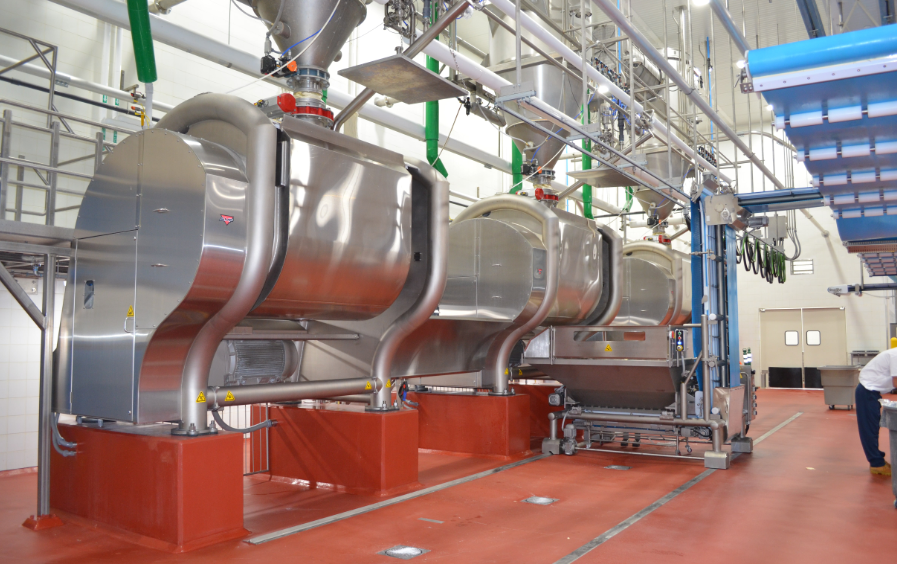Table of Contents
- Introduction to Industrial Mixers
- Types of Industrial Mixers
- Advantages of Ribbon Blenders
- Applications of Ribbon Blenders
- How to Choose the Right Mixer
- Maintenance and Safety Tips
- Latest Trends in Industrial Mixing
- Concluding Thoughts
Introduction to Industrial Mixers
Industrial mixers are essential in various manufacturing sectors, including food processing, pharmaceuticals, and chemicals. They play a crucial role in ensuring the final product’s uniformity, consistency, and quality. These machines are designed to meet the specific needs of different industries, ensuring that each product batch meets the desired specifications.
Understanding the different types of mixers and their applications can significantly improve your production processes, minimize waste, and enhance product quality. Businesses can streamline operations and achieve higher productivity using the proper mixing equipment.
Types of Industrial Mixers
Industrial mixers come in several forms, each suited for specific applications. Among the various options, the ribbon blender stands out for its versatility and efficiency in handling dry and wet materials. The most common types include:
- Ribbon Blenders are ideal for homogeneous mixing of powders and granules. They are instrumental in the food and pharmaceutical industries, where precise mixing is crucial.
- Paddle Mixers are best for gentle mixing and low-shear applications. They are commonly used in the animal feed and plastic industries.
- High-Shear Mixers: These mixers are perfect for emulsifying, homogenizing, and dispersing. They are essential in industries that require fine mixing, such as cosmetics and specialty chemicals.
- Planetary Mixers are suitable for viscous materials and heavy-duty applications. They are often used in bakeries to produce adhesives and sealants.
Engineering News provides an insightful overview of various industrial mixers and their uses, emphasizing their importance in modern manufacturing.
Advantages of Ribbon Blenders
Ribbon blenders are renowned for their efficiency and versatility. Some of their key advantages include:
- Uniform mixing of powders and granules: Ribbon blenders’ unique design ensures a thorough blend, minimizing the risk of ingredient separation.
- Energy efficiency: Ribbon blenders consume less power than other mixers, making them cost-effective in the long run.
- Low operational costs: With fewer moving parts and a straightforward design, ribbon blenders incur minimal maintenance costs.
- Easy to clean: Their simple design allows quick and effective cleaning, reducing downtime between batches.
- Minimal maintenance requirements: Built to last, these blenders require minimal upkeep, ensuring continuous operation without frequent interruptions.
Applications of Ribbon Blenders
Ribbon blenders are used across a broad spectrum of industries. Some notable applications include:
- Food industry: Mix spices, flour, and other ingredients to create consistent, high-quality food products.
- Pharmaceuticals: Blending medicinal powders to ensure uniformity in each dosage is critical for drug efficacy and safety.
- Chemicals: Mixing paints, resins, and fertilizers to achieve a uniform distribution of components.
- Agriculture: Preparing animal feeds with a balanced mix of nutrients to support livestock health and productivity.
How to Choose the Right Mixer
Selecting the appropriate mixer depends on several factors. To make an informed decision, consider the following:
- Nature of the materials to be mixed: Different materials have unique properties, such as density and flowability, which can influence mixer selection.
- Batch size and production capacity: Determine the volume of material to be mixed in each batch and the overall production requirements to choose a mixer with suitable capacity.
- Mixing time requirements: Some processes require rapid mixing, while others benefit from slower, more thorough blending. Choose a mixer that aligns with your process timelines.
- Cleaning and maintenance capabilities: Consider how easy the mixer is to clean and maintain, especially if you frequently switch between different products.
For more detailed guidance, consult resources such as Manufacturing.net, which offers in-depth advice on selecting the suitable industrial mixer for various applications.
Maintenance and Safety Tips
To ensure longevity and safe operation, follow these tips for maintaining and using industrial mixers:
- Regularly inspect the mixer for wear and tear: Routine checks can help identify potential issues before they lead to significant breakdowns.
- Follow the manufacturer’s maintenance schedule: Adhering to recommended maintenance intervals can extend the life of your equipment and maintain its efficiency.
- Implement safety protocols to protect operators: Ensure all operators are trained on safe handling and operating procedures to prevent accidents.
- Store spare parts for quick replacements: Keeping essential spare parts on hand can minimize downtime in case of unexpected equipment failures.
Latest Trends in Industrial Mixing
As technology evolves, so do industrial mixing solutions. Current trends in the industry include:
- Automation and intelligent mixers: Advanced mixers with sensors and control systems can enhance precision and repeatability, reducing human error and improving consistency.
- Eco-friendly designs: Manufacturers increasingly focus on creating mixers that minimize energy consumption and environmental impact, aligning with global sustainability goals.
- Integration with IoT: IoT-enabled mixers allow real-time monitoring and control, providing valuable data insights to optimize mixing processes and improve efficiency.
Concluding Thoughts
Understanding the different types of industrial mixers, their advantages, and their applications can help you make informed decisions about your production needs. You can optimize efficiency and ensure long-term reliability by selecting a suitable mixer and following proper maintenance. Investing in the appropriate mixing equipment is a crucial step towards achieving high-quality and consistent products, ultimately contributing to the success and growth of your business.

